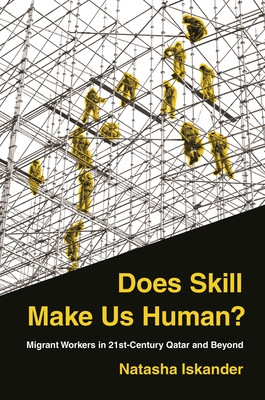An in-depth look at Qatar's migrant workers and the place of skill in the language of control and powerSkill—specifically the distinction between the “skilled” and “unskilled”—is generally defined as a measure of ability and training, but Does Skill Make Us Human? shows instead that skill distinctions are used to limit freedom, narrow political rights, and even deny access to imagination and desire. Natasha Iskander takes readers into Qatar’s booming construction industry in the lead-up to the 2022 World Cup, and through her unprecedented look at the experiences of migrant workers, she reveals that skill functions as a marker of social difference powerful enough to structure all aspects of social and economic life. Through unique access to construction sites in Doha, in-depth research, and interviews, Iskander explores how migrants are recruited, trained, and used. Despite their acquisition of advanced technical skills, workers are commonly described as unskilled and disparaged as “unproductive,” “poor quality,” or simply “bodies.” She demonstrates that skill categories adjudicate personhood, creating hierarchies that shape working conditions, labor recruitment, migration policy, the design of urban spaces, and the reach of global industries. Iskander also discusses how skill distinctions define industry responses to global warming, with employers recruiting migrants from climate-damaged places at lower wages and exposing these workers to Qatar’s extreme heat. She considers how the dehumanizing politics of skill might be undone through tactical solidarity and creative practices. With implications for immigrant rights and migrant working conditions throughout the world, Does Skill Make Us Human? examines the factors that justify and amplify inequality.
An in-depth look at Qatar''s migrant workers and the place of skill in the language of control and power
Skill—specifically the distinction between the “skilled” and “unskilled”—is generally defined as a measure of ability and training, but Does Skill Make Us Human? shows instead that skill distinctions are used to limit freedom, narrow political rights, and even deny access to imagination and desire. Natasha Iskander takes readers into Qatar’s booming construction industry in the lead-up to the 2022 World Cup, and through her unprecedented look at the experiences of migrant workers, she reveals that skill functions as a marker of social difference powerful enough to structure all aspects of social and economic life.
Through unique access to construction sites in Doha, in-depth research, and interviews, Iskander explores how migrants are recruited, trained, and used. Despite their acquisition of advanced technical skills, workers are commonly described as unskilled and disparaged as “unproductive,” “poor quality,” or simply “bodies.” She demonstrates that skill categories adjudicate personhood, creating hierarchies that shape working conditions, labor recruitment, migration policy, the design of urban spaces, and the reach of global industries. Iskander also discusses how skill distinctions define industry responses to global warming, with employers recruiting migrants from climate-damaged places at lower wages and exposing these workers to Qatar’s extreme heat. She considers how the dehumanizing politics of skill might be undone through tactical solidarity and creative practices.
With implications for immigrant rights and migrant working conditions throughout the world, Does Skill Make Us Human? examines the factors that justify and amplify inequality.
Get Does Skill Make Us Human? by at the best price and quality guranteed only at Werezi Africa largest book ecommerce store. The book was published by Princeton University Press and it has pages. Enjoy Shopping Best Offers & Deals on books Online from Werezi - Receive at your doorstep - Fast Delivery - Secure mode of Payment
 Jacket, Women
Jacket, Women
 Woolend Jacket
Woolend Jacket
 Western denim
Western denim
 Mini Dresss
Mini Dresss
 Jacket, Women
Jacket, Women
 Woolend Jacket
Woolend Jacket
 Western denim
Western denim
 Mini Dresss
Mini Dresss
 Jacket, Women
Jacket, Women
 Woolend Jacket
Woolend Jacket
 Western denim
Western denim
 Mini Dresss
Mini Dresss
 Jacket, Women
Jacket, Women
 Woolend Jacket
Woolend Jacket
 Western denim
Western denim
 Mini Dresss
Mini Dresss
 Jacket, Women
Jacket, Women
 Woolend Jacket
Woolend Jacket
 Western denim
Western denim
 Mini Dresss
Mini Dresss






























































